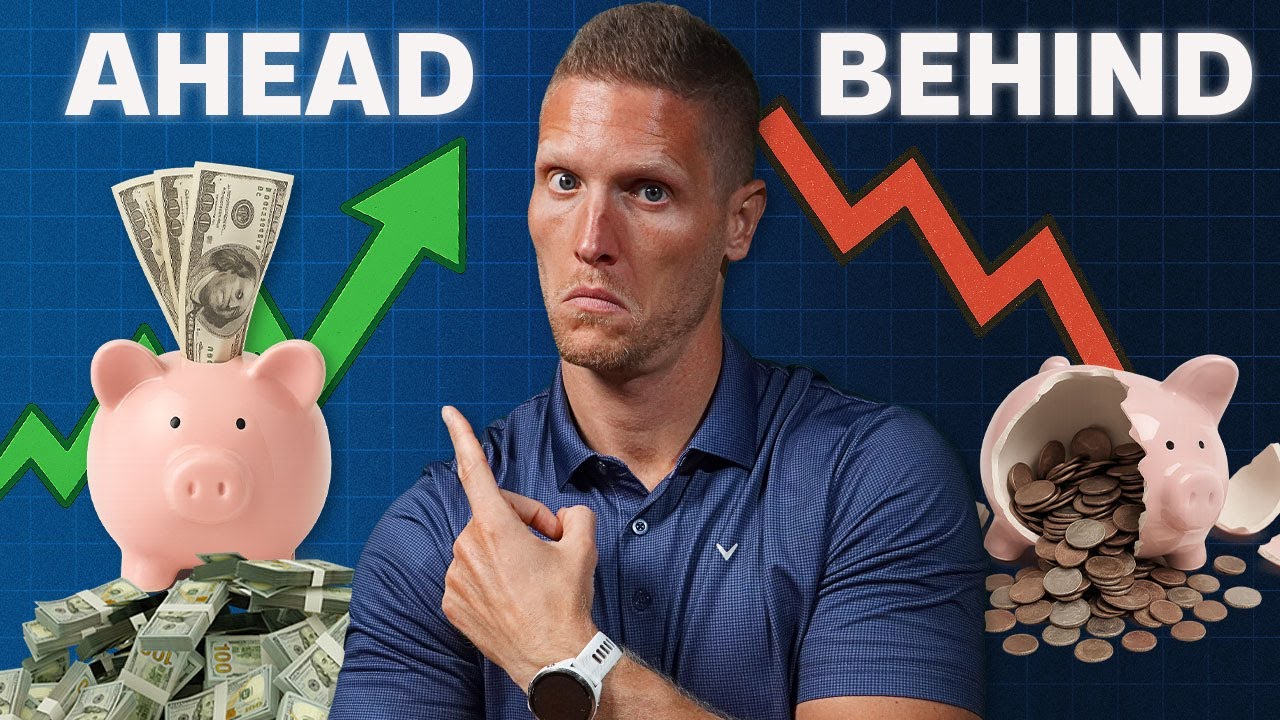Let’s go ahead and talk about 30-somethings, guys. When you’re in your 30s, if I could only give you three to four pieces of advice to take super seriously, the first one is let’s make wealth automatic and completely inevitable. Yeah, it’s one of those things that if you can set yourself up for success, the things that you do will protect you from falling into the trap of the things that you don’t do. And one of the best ways that you can master this is by understanding deferred gratification. I would care more about what’s going to happen to me tomorrow than what I get to experience and have right now today. Well, this is not an easy thing. I think a lot of people default to instant gratification. We get caught in this present bias where if you go get a donut, that donut tastes really good. I mean, and you don’t have to worry about what does that mean in the future. Because if you eat donuts constantly, obviously it’s not going to turn out well in the long term. Meanwhile, when you make deferred gratification decisions, it’s hard. So, here’s what: when something’s hard like that, you need to create habits. And this is something we talk about. You’ve got to make the good habits easy and the bad habits hard. And one of the first things you can do to make the good habits easy is setting up automatic wealth building. Guess what? There are some things that immediately come to mind: your employer’s plan, your 401(k). Get that match money. It also takes a percentage of your income. It’s just automatically going to go in every month. That is making a good habit very easy. Another thing you can do is follow the financial order of operations. Brian, you have the deliverable on moneyguide.com/resources. Download that. This will actually walk you through the nine tried and true steps of what to do with your dollars to make those habits easy and reinforceable. So not only are you doing the things like getting the employer match, but you’re also making sure you have an emergency fund in place. You’re going to get all of your tax-free dollars working in your Roth IRAs and your HSAs. If you can set those on autopilot, you will be amazed at how quickly your financial ship starts building.
Now, let’s close this one out. I want to make the bad habits hard. How do we do this? Well, one of the first things, if money’s in your pocket or money’s just sitting in your bank account not accounted for, it has a tendency to slip out or leak out, as we like to say. What you need to do is be very deliberate. So, I created a system called “force scarcity.” When you get pay raises, I want you to take the 60/40 challenge. Meaning, whatever comes out of your after-tax pay raise, I want 60% to be allocated towards increasing your monthly investments, and then I want 40% to be left for lifestyle increases. If you can do this, if you can practice force scarcity, it will allocate your money in a very healthy way, making the good habit very easy. But it also restricts the leakage of your money because every dollar will have a purpose.
Now, we know that the 30s are a hard time. We get pulled in a thousand different directions by a thousand different things. So, one of the disciplines you have to master here is not letting short-term worries, short-term obstacles, or short-term problems cause you to implement permanent solutions that will ultimately lead to permanent problems. Yeah, I think when we talk about short-term solutions, I mean, short-term problems. These are things like you’re in the messy middle, as you described, where you’re trying to figure out how do you pay for daycare for the kids or how do you save up for the car or even that first home purchase. Those are big, heavy decisions, but they’re decisions that will only be something that you’re struggling through for this short period of time. What we don’t want you to do is to have a short-term problem that you put a permanent solution to, like lowering your monthly savings and investment plan or cashing out your Roth IRA. Those types of things might seem like an easy solution at the time that can solve this problem, but they actually are robbing yourself, creating a permanent problem for your long-term financial health. So you have to make sure you stay disciplined in doing that and you don’t use an artificial bridge to cover that up.
You have to make sure that in your 30s, if you really want to work towards millionaire status, you need to be scared of debt. Now, debt can be a tool and it can be something that you use and utilize, but just like a chainsaw, if used improperly or used carelessly, it can cut you off at the knees. Yeah, I like using the chainsaw as a great example because I know we all can think about going to any type of scary house or haunted house where they’re cranking up the chainsaw. Of course, they take the chains off, but they sit there and rev them up, and you’re scared to death when somebody comes around with a chainsaw. If you are using debt and you’re not scared, you’re using it wrong.
So that’s why credit card debt, let me tell you, we are one of those financial channels where we actually don’t have a problem with using credit cards. We both use credit because it would be wrong; we eat our own cooking. We actually practice what we preach. We’d be hypocrites if we told you not to use credit cards and then we’re out there whipping out the plastic all the time. So here’s what we tell you: credit card use is okay, but credit card debt? No way. That’s where you’ve got to stay away. If you’re not paying it off every month, you are blowing it because if you want to turn compounding interest from friend to foe, don’t pay off your credit card monthly.
How about this? How about auto loans? You know that here we love the 20/3/8 rule when it comes to buying a car. We want you to put 20% down. We don’t want you to finance it for any more than 36 months or three years. And all of your auto loan payments cannot exceed 8% of your monthly gross income. Now, that’s true of normal cars. If you’re moving into luxury brands, if you’re buying a BMW or Mercedes, a brand like that, we want you to pay it off in one year. 20/3/8 does not apply. And the most important part of auto loan purchasing is that you must make sure your monthly investments, the amount that you are putting in your investment accounts to grow for the future, is greater than your car payment. If you’re saving $200 a month and you have a thousand-dollar car payment, you are doing it wrong.
Yeah, you know what I love about these rules, Bo? We also have some new deliverables on this, you know, with car buying as well as housing because that is the Money Guy rule. The next one I want to talk about is housing, and this one’s a hot topic right now because interest rates are way up. So, this is even more important when you’re making these decisions. You do need to make sure this is a long-term decision. We’ve got five to seven years, meaning this is not something if you think you’re going to change jobs, be relocated, or you’re just not sure. You want to maybe consider your life situation, like getting married or having additional children. If you can’t lock into this decision for five to seven years, you’re not doing it right.
We also want to make sure on house upgrades. You’re going to need, like, meeting you’re living in a house currently, but you want to upgrade to a nice house. That’s a 20% down payment, and that’s pretty standard. What I will tell you, we’re kind of unique on first-time home purchases. We’re okay if you only have to put down three to five percent. We give you a little flexibility. But then, cash flow-wise, please keep your housing costs, I’m talking about the principal and interest, I’m talking about the property taxes and insurance, try to keep those below 25% of your gross income because we want you to be life rich, not house rich, life poor. There’s a disconnect there, and I know this is hard with interest rates being as high as they are, but it is one of those things where I think if you’ll really work through this, you will make sure that you leave enough margin in your life that you can have housing, but also live a life where you can save for the future. The more you can keep yourself inside these guardrails and set yourself up for inevitable wealth in the 30s, the more you’ll thank yourself in your 40s, 50s, and 60s.
Now, let’s talk about our millionaire math. If you are someone who is in your 30s and you’re just now figuring this out, you’re just now starting to save, and you want to reach millionaire status by the time you get to 65, for a 30-year-old, you need to be saving $340 a month, or you need to have already accumulated at this point a little over $43,000. By the time you get to 35, if you’re starting at zero, you need to either start saving $600 a month or you have almost $79,000 saved up. And by the time you get to the end of your 30s, 39 years of age, if you’re just now starting out, you need to save about $943 a month to reach millionaire status, or you need to make sure that you’ve been saving and you’ve accumulated at least $122,000.
Now, I’m gonna go into extra credit territory here for the financial mutants. I know that the $43,000 for the 30-year-old, the $79,000 for the 35, and the $123,000 for the 39-year-old are what you have to have and not add a dollar to it to reach millionaire. But a lot of you financial mutants, I would challenge you, do a spot check. See where you are based upon your age. We did it in the content meeting. You’re right, you yelled out, “Another Brian, are you with this?” So do the same thing for yourself. I know that that is extra credit because this is just to get you in a million, but we know we want to get you to two, maybe even three million. It’s nothing wrong with going ahead and doing a spot check and then challenging yourself to go even beyond.
So if you’re someone in your 30s and you want to know where you are, are you on track? Go to moneyguy.com/resources and download our free deliverable. Are you on track to be a millionaire? If you want to make sure that your friends are also on track, send them a copy of it, email them, and tell them to go down and say, “Hey guys, I’m on track to be financially independent. Are you as well?” Use this as a tool to spread the good news of sound financial decision making, even in a decade when life is really, really, really difficult.














